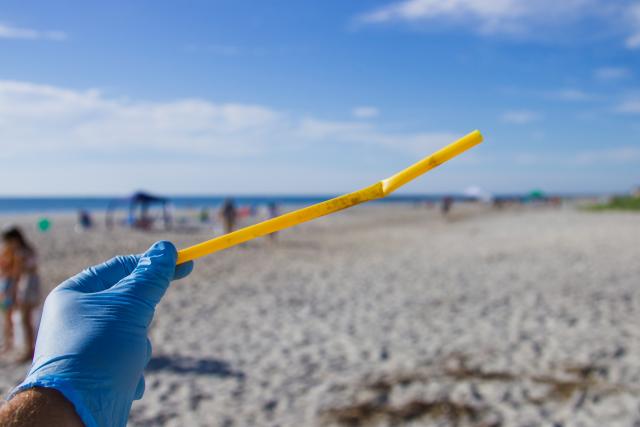By Mikayla van Loon
With less than a week until a statewide single-use plastics ban comes into effect, businesses, not-for-profits and other hospitality services have been left scrambling to figure out what they can and can’t use.
Mount Evelyn’s Tasty Az founder Jules Morman said she has been “crazily trying to prepare” with a “skeleton of information” provided by the State government before 1 February when the ban takes place.
As a social enterprise catering and cafe business, single-use items can be key to the way Tasty Az operates.
Under the ban, the use of plastic cutlery, single-use plastic straws, plastic plates, cotton buds and foodware and cups made from expanded polystyrene is a fineable offence
Although taking steps herself to more eco-friendly practices by using bamboo cutlery and PET biodegradable containers and lids, Jules said some things remain unclear.
“We understand single-use straws. We totally get that, we understand. There’s no plastic cutlery and I think everybody’s been walking away from that for a long time. We understand anything that’s harmful to sea life or wildlife.
“We’ve all been diligently doing our bit but now we’re looking at all those extra little things that haven’t been addressed.”
A spokesperson from the Department of Energy, Environment and Climate Action said this ban falls inline with others happening around the country in NSW, SA, QLD and WA.
“We’re taking action to protect our environment by banning problematic single-use plastics and supporting businesses to switch to reusables, to protect our health, waterways and our planet,” they said.
Within the State government’s fact sheet about the ban, biodegradable straws have also been highlighted as ‘not allowed’ despite potentially using “compostable plastic or ‘plant-based’ plastic”.
“We currently do have straws and last year we moved them over to biodegradable straws, but they are about to be eliminated. So no single-use straws will be in so we’ve got them until the end of January,” Jules said.
While this is just the first phase of the single-use plastics ban, paper plates which have a plastic lining won’t be included until November 2024 but businesses are advised to begin reducing these products now.
Jules said “that’s where I’m stumbling”, finding it hard to gain clarity around compostable and biodegradable plastics for such paper items.
Having spoken to colleagues and others in the hospitality industry, Jules said it has all been rather confusing, with no one quite clear on the ban.
With potential stock piles of straws or other items, given many organisations were forced during Covid for hygiene reasons to use single-use items, Jules said she is now unsure what to do with them.
“My concern is, well, what do I do with them now? I’m not going to put them in the rubbish, because that’s what we’ve been trying to avoid doing.
“Ultimately, the end result is the same, that those single-use plastics end up in the environment, regardless of who puts them there but there’s not that clarity, in the rules or in the government websites that are giving us some answers there.”
The fact sheet states organisations under the ban should contact their suppliers to see if they can return or exchange items or “contact a local recycler to see if they can accept any of your items.”
Star Mail contacted some local sporting clubs about the ban, as they will also be held liable for the use of single-use plastic items listed, and while most said the ban wouldn’t impact them too much, they were either grateful for the reminder or weren’t aware the ban came into effect in February.
This ban comes as Australia makes a push towards reusable items across businesses, not-for-profits, sporting clubs, charities, manufacturers and many more to reduce landfill waste.
From 1 January 2026, manufactured products with single-use items like juice boxes with straws or yoghurt tubs with spoons will also be banned from circulation.
As organisations in the Yarra Ranges work towards the 1 February deadline, Jules said many are working together to understand the ban.
“We’re also busy trying to run our businesses, so I’ll talk to the supplier and we’re sharing information amongst ourselves at the moment,” she said.
In the lead up to the ban, information can be accessed via the www.vic.gov.au/plastics website, by calling the toll free hotline on 1800 844 946, or emailing sustainability@nra.net.au
The National Retail Association is also conducting free information sessions every Friday at 11am until the end of February.







